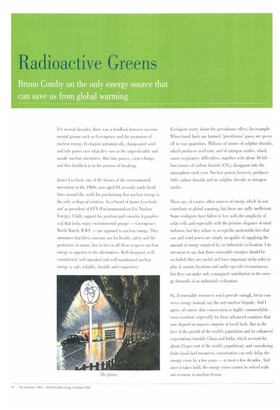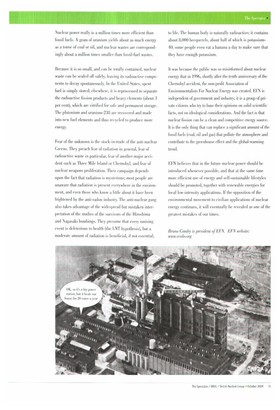adioactive Green
Bruno Comby on the only energy source that can save us from global warming
For several decades. there was a deadlock between environmental groups such as Greenpeace and the promoters of nuclear energy. Ecologists automatically championed wind and tide power over what they saw as the unpredictable and unsafe nuclear alternative. But time passes. views change. and this deadlock is in the process of breaking.
James T.ovelock, one of the heroes of the environmental movement in the 1960s, now aged 84, recently made headlines around the world for proclaiming that nuclear energy is the only ecological solution. As a friend of James Lovelock, and as president of FFN (Environmentalists For Nuclear Energy), I fully support his position and consider it paradoxical that today many environmental groups — Greenpeace., World Watch, WWF — are opposed to nuclear energy. They announce that their concerns are for health, safety and the protection of nature. but in fact in all these respects nuclear energy is superior to the alternatives. Well-designed, wellconstructed, well-operated and well-maintained nuclear energy is safe_ reliable, durable and competitive.
Ecologists worry about the greenhouse effect, for example. When fossil fuels are burned, 'greenhouse' gases arc given off in vast quantities. Millions of tonnes of sulphur dioxide, which produces acid rain, and of nitrogen oxides, which cause respiratory difficulties, together with about 30 billion tonnes of carbon dioxide (CO2), disappear into the atmosphere each year. Nuclear power, however, produces little carbon dioxide and no sulphur dioxide or nitrogen oxides.
There are, of course, other sources of energy which do not contribute to global warming, but these are sadly inefficient. Some ecologists have fallen in love with the simplicity of solar cells and especially with the pristine elegance of wind turbines, hut they refuse to accept the undeniable fact that sun and wind power are simply incapable of supplying the amount of energy required by an industrial civilisation. I do not mean to say that these renewable energies should he excluded; they are useful and have important niche roles to play in remote locations and under special circumstances, but they can make only a marginal contribution to the energy demands of an industrial civilisation.
So, if renewable resources won't provide enough, let us conserve energy instead, say the anti-nuclear brigade. And I agree, of course, that conservation is highly commendable, even essential, especially for those advanced countries that now depend on massive imports of fossil fuels. But in the face of the growth of the world's population and its enhanced expectations {notably China and India, which account for about 35 per cent of the world's population), and considering finite fossil-fuel resources, conservation can only delay the energy crisis by a few years — at most a few decades. A.nd once it takes hold, the energy crisis cannot be solved without recourse to nuclear fission. Nuclear power really is a million times more efficient than fossil fuels. A gram of uranium yields about as much energy as a tonne of coal or oil, and nuclear wastes are correspondingly about a million times smaller than fossil-fuel wastes.
Because it is so small, and can be totally contained, nuclear waste can he sealed off safely, leaving its radioactive components to decay spontaneously. In the United States, spent fuel is simply stored; elsewhere, it is reprocessed to separate the radioactive fission products and heavy elements (about 3 per cent), which are vitrified for safe and permanent storage. The plutonium and uranium-238 are recovered and made into new fuel elements and thus recycled to produce more energy.
Fear of the unknown is the stock-in-trade of the anti-nuclear Greens. They preach fear of radiation in general, fear of radioactive waste in particular, fear of another major accident such as Three Mile Island or Chernobyl, and fear of nuclear weapons proliferation. Their campaign depends upon the fact that radiation is mysterious; most people are unaware that radiation is present everywhere in the environment, and even those who know a little about it have been frightened by the anti-radon industry. The anti-nuclear gang also takes advantage of the widespread but mistaken interpretation of the studies of the survivors of the Hiroshima and Nagasaki bombings. They presume that every ionising event is deleterious to health (the I.NT hypothesis), but a moderate amount of radiation is beneficial, if not essential, to lifc. The human body is naturally radioactive; it contains about 8,000 becquerels, about half of which is potassium40; sonic people even eat a banana a day to make sure that they have enough potassium.
It was because the public was so misinformed about nuclear energy that in 19%, shortly after the tenth anniversary of the Chernobyl accident, the non-profit Association of Environmentalists For Nuclear Energy was created. FEN is independent of government and industry; it is a group of private citizens who try to base their opinions on solid scientific facts, not on ideological considerations. And the fact is that nuclear fission can be a clean and competitive energy source. It is the only thing that can replace a significant amount of the fossil fuels (coal, oil and gas) that pollute the atmosphere and contribute to the greenhouse effect and the global-warming trend.
FEN believes that in the future nuclear power should be introduced whenever possible, and that at the same time more efficient use of energy and self-sustainable lifestyles should be promoted, together with renewable energies for local low-intensity applications. lithe opposition of the environmental movement to civilian applications of nuclear energy continues, it will eventually be revealed as one of the greatest mistakes of our times.



















































































































 Previous page
Previous page